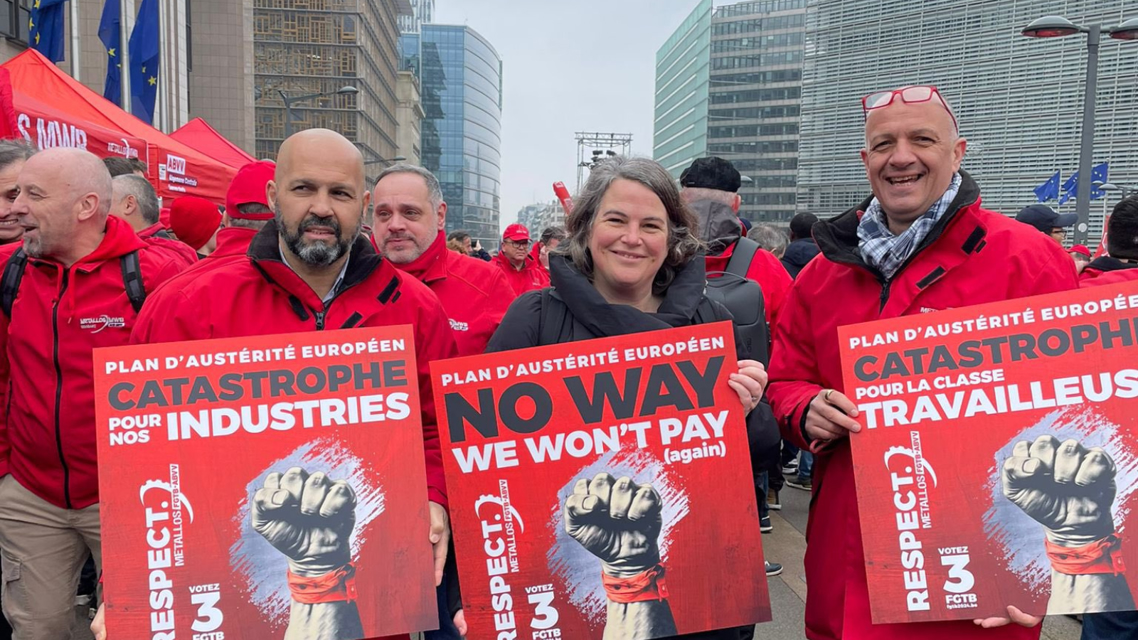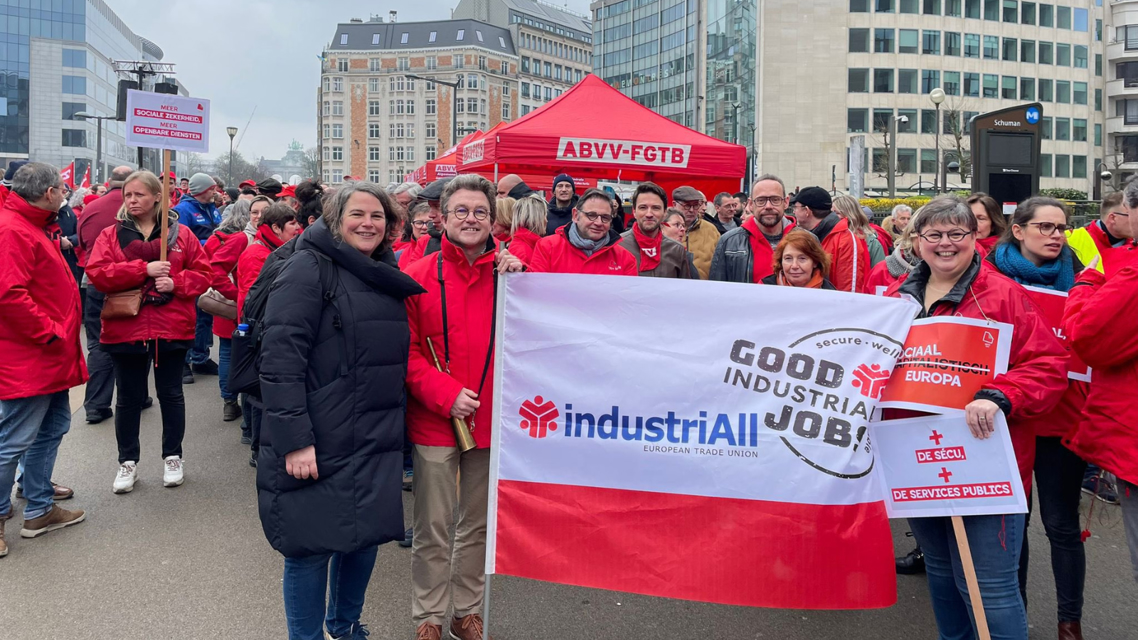Trade unions urge policymakers to take their responsibility and vote against a reform that reintroduces austerity and undermines Europe’s industrial ambitions and the Green Deal.
IndustriAll Europe joined the demonstration on 12 March, called by the Belgian trade union confederation FGTB, to urge the European Parliament to reject the current deal on reforming the EU’s economic governance rules and to call for new fiscal rules to be negotiated in a second reading by the European Parliament.
The current deal implies macroeconomic fiscal rules that do not give Member States the space to invest in an industrial policy that delivers on the goals of the European Green Deal and ensures high quality jobs in Europe and a Just Transition for workers.
The figures speak for themselves when comparing the investment needs with the cuts that the new rules will impose on Member States.
The European Commission estimates that around €620 billion of public and private investments will be needed in the EU each year to deliver the European Green Deal and the REPowerEU Plan, with an additional €92 billion needed to meet the objectives of the Net-Zero Industry Act over the period 2023-2030. On top of this, new additional investment gaps are regularly identified, like in the EU Grids Strategy, which foresees €450 billion of investment in energy infrastructure alone by 2030. Leading think-tanks Agora, Bruegel and Bacciati estimate that governments will need to invest around 1%–1.9% of their GDP, or €159 billion to €323 billion per year, to achieve the EU’s climate targets. Even the ECB has recently stated that between 1% and 1.8% of EU GDP would be required in additional annual green public spending in the period 2021-30.
These figures highlight an obvious contradiction between the investment gaps and the fiscal rules. An initial assessment by the ETUC outlines that EU countries would need to make cuts of more than €100 billion next year to comply with the new economic governance rules. The new rules agreed in the trilogue are worse than the Stability and Growth Pact for 9 countries.
The new debt rules have a much stricter enforcement mechanism. The mandatory debt and deficit reduction requirements will become hard rules which must be complied with, and spending cuts or tax increases would be needed, and reforms would be necessary. Getting the rules wrong now, would mean being stuck with the wrong framework for at least the next decade. A second reading is possible.
IndustriAll Europe General Secretary, Judith Kirton-Darling joined the demonstration:
“The new fiscal rules will directly undermine the EU’s ambitious plans. This is particularly worrying as work has not even started on a permanent EU investment instrument. It would be irresponsible to approve any new rules before a permanent EU instrument is put in place with sufficient resources to guarantee investment needed in all Member States to deliver the Green Deal and keep high quality jobs in Europe.
“At a time when other major economies, most notably the US, are investing in clean tech and good jobs through a more flexible fiscal approach, the EU is about to tie its own hands with new economic governance rules that will prevent almost all Member States from investing.
“We are not calling for no economic governance rules at all, but the current deal is not fit for the challenges that Europe faces. Policymakers clearly need more time to negotiate more adequate rules and that is why we are calling on MEPs to send the current text back for a second reading.”
Research shows that the far right has tripled in the last decade as austerity has been imposed in Europe. The success of the far right has come at the expense of mainstream parties that imposed austerity. Europe must learn from the positive experience of the rapid recovery after the COVID-19 crisis, based on investment through the common European Recovery and Resilience Facility. Instead of returning to the failed recipes of the 2010s, policymakers should build on the solidarity forged during the pandemic.
Trade unions therefore urge policymakers to take their responsibility and vote against a reform that reintroduces austerity and undermines Europe’s industrial ambitions and the Green Deal.


.png?width=1200&height=640&rmode=max&format=jpg&quality=100)

.png?width=1200&height=640&rmode=max&format=jpg&quality=100)
.png?width=1200&height=640&rmode=max&format=jpg&quality=100)
